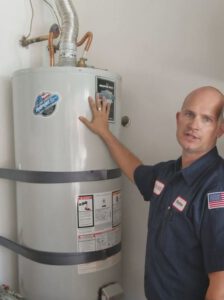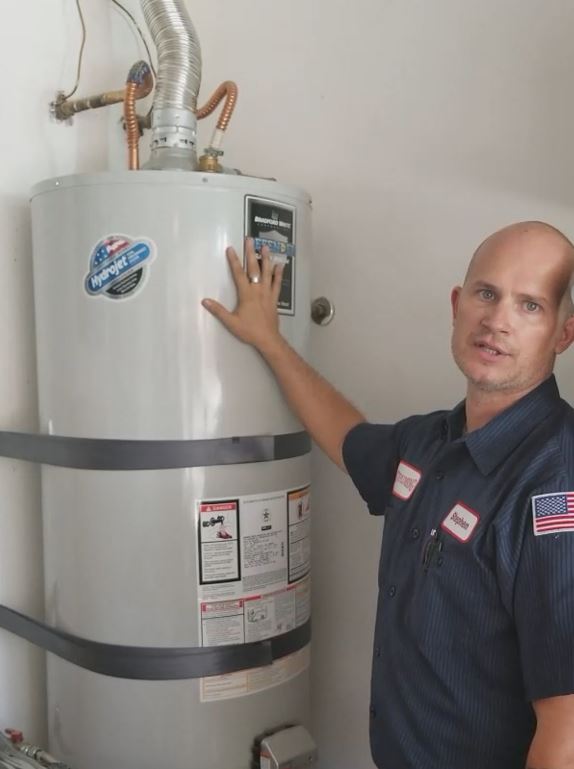Many homeowners take their water heaters for granted. That is, until it starts acting up.
The first thing to do is make sure the circuit breaker or high-temperature cut-off switch is not tripped. If they are, reset them and replace any open fuses. If that doesn’t solve the problem, the next step is to check for power in the field wiring compartment. However, if you need some professional help, contact Water Heater Repair Tampa.
If you have hot water but it feels like lukewarm water, there are a few things you can try. First, make sure that the thermostat isn’t turned down too low; this can lead to scalding and skin irritation. If the temperature is set correctly, it may be time to invest in a newer, more energy-efficient water heater.
Then, if your water is still lukewarm, you should check the anode rod; this is what prevents rust and corrosion on various metallic parts inside your tank. The rod is made from magnesium, and when it wears out, rust will start to build up on the internal components and cause leaks. A plumber will be able to replace the anode rod for you.
Another problem related to water temperature is that you might have a problem with the thermostat. If you aren’t able to get your water up to the desired temperature, it could mean that the thermostat has gone bad and needs replacement. A plumber can come out and install a new thermostat.
Finally, if you have a water leak from the top of your tank, you’ll want to check if the drain valve is loose or damaged. If it is, you can tighten it, but if the leak continues to happen, you’ll need to call a plumber for repairs or even a replacement.
Water heater leaks can also occur near the fittings, especially if your tank is starting to corrode from the inside. A plumber will be able to replace any leaking valves and fix loose bolts on the heating element. If you have a gas-powered water heater, you’ll need to look at the pilot light; if it is out, you’ll need to call a professional for help with replacing or fixing the thermocouple.
No matter what problem you might be having with your water heater, it’s important to remember that working on electrical appliances and plumbing can be dangerous if you don’t know what you’re doing. Always be sure to turn off the power and gas supply to your water heater and use a non-contact voltage tester to ensure that there are no electric or gas connections before proceeding.
Odd Noises
If you hear odd noises coming from your water heater, it may not be time for a full replacement. Rather, it’s likely that your appliance needs some maintenance or repairs. Understanding what sounds are normal and which ones are a warning sign will help you feel more comfortable with the operation of your home’s water heater.
If your water heater is making a hissing or crackling sound, it’s most likely because of a buildup of sediment in the tank. This is a common issue for electric water heaters. Using a descaling product or flushing and draining the tank should solve this problem.
Hissing noises from your hot water heater could also be caused by a faulty valve. This is a serious problem that should not be ignored but can be fixed by a professional plumber.
Water heaters are often tucked away in the garage or a utility closet, so it’s easy to forget about them until they start making strange sounds. If you hear hissing or humming from your water heater, it’s a good idea to schedule a service appointment as soon as possible.
Other odd sounds your water heater may make include popping and rumbling sounds. These are most often caused by a buildup of sediment. This is because the sediment traps steam bubbles, which then burst through it as they heat up.
A banging sound from your water heater can be a sign of a faulty valve or other mechanical issue. It may also indicate that you have a water hammer problem, which is when pressure in the system builds up and then drops suddenly. This can cause your pipes to burst, which is a dangerous and expensive situation to be in.
Screeching sounds from your water heater are almost always a sign of a major issue that you shouldn’t ignore. This could be caused by a broken part or a leak in the unit, and it’s essential to call a plumber right away. Doing so can prevent further damage to your property and potential injuries for you or your family.
Water Smells or Discoloration
If you notice a sulfurous, decayed, or sewage-like smell in your home’s water, it could indicate that bacteria are growing inside the tank of your gas or electric water heater. This is especially likely if the unit hasn’t been used for some time or if it shares a circuit with another appliance that draws large amounts of power when turned on (i.e., a washing machine). If this happens, the solution may be to flush the water heater by draining and refilling the tank and letting it run through its heating cycle. A replacement element might also be necessary if this is the case.
In the event that your water is discolored, first check to see if it’s happening with just hot or cold water. Next, ask your family members and neighbors if they’re experiencing the same problem. If it only affects one faucet or is isolated to a single room in the house, this might be an indication of a pipe or water supply problem and would require a call to your local utility company.
Dark brown or muddy-colored water can be the result of dissolving iron from pipeline sediments. This can happen naturally from time to time, but changes in water flow caused by construction activity, fire hydrant testing and flushing, or plumbing problems can disturb these deposits, which can cause the water’s taste, smell, or color to change.
The same is true for a musty or rotten egg smell, which can be the result of hydrogen sulfide. Hydrogen sulfide is created by sulfur bacteria that use the naturally occurring sulfur in your water as a source of food. These bacteria are not harmful, but the odor can be unpleasant.
If you have a gas water heater, check to see if the pilot light is out. If it keeps going out, it’s possible that the thermocouple needs replacing or the gas control valve is faulty. This is a complex job that should only be done by a qualified service professional.
Cold Water Only
It’s easy to take a working water heater for granted, but it can be a huge disruption to your home life when it goes on the fritz. Without a functioning water heater, showers become impossible, laundry gets neglected, and dishes pile up. Fortunately, most water heater problems are not as serious as you might think. Before calling a professional for a Buffalo water heater repair, follow these steps to troubleshoot and figure out what the problem is.
Start by determining whether the issue is localized to one faucet or throughout your home. If it’s just one tap, there could be a simple plumbing issue with that faucet. If it’s happening all over your home, then the problem is most likely with the water heater.
If you have an electric water heater, there’s a chance that the thermostat or high-temperature cutoff switch might be faulty. If you’ve reset them but they continue to trip, then it’s time to call an electrician.
There is also the possibility that your pipes are clogged. Older steel water lines may be filled with mineral deposits that restrict water flow. If yours are particularly old, a plumber will be needed to clean them out.
With a gas-powered water heater, a pilot light that won’t stay lit can be a sign of a malfunctioning thermocouple. This small probe is meant to sit in the flame of the pilot light and stop the flow of gas if it goes out, but it can get knocked off track or covered with grime over time. If you’ve relighted the pilot light and it still won’t stay on, it’s probably time to call a technician.
It’s always best to contact a professional for the most effective and cost-efficient service. Some types of repairs can be handled by the homeowner, but some are much more complicated and require a skilled professional. Enter your zip code below to get matched with top-rated pros near you. Get quotes instantly and schedule your service. No obligation. No spam. Guaranteed. We protect your privacy.

